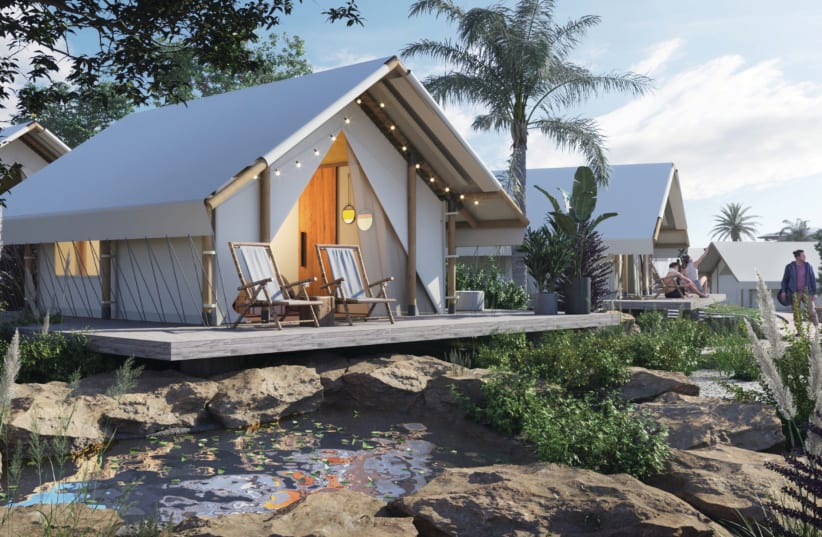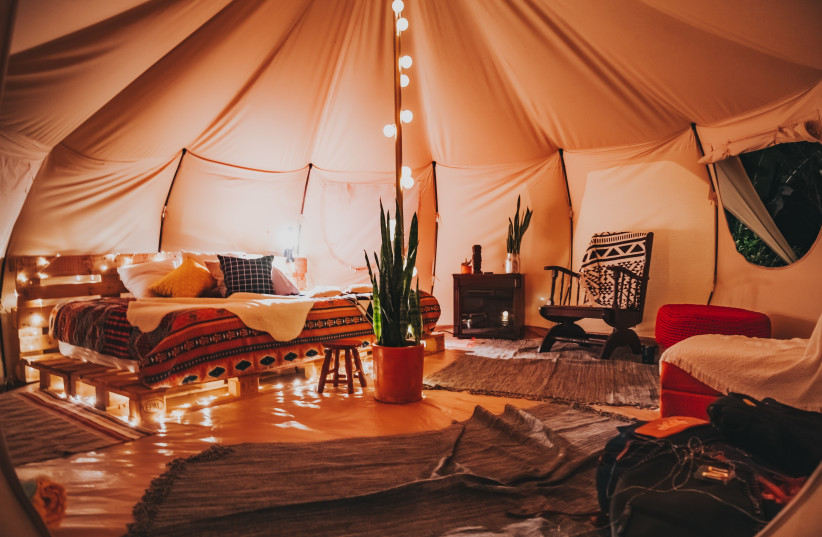After being isolated and unable to travel during the pandemic, pictures of airports struggling with baggage-handling chaos indicated that there was a change. Travel is back. However, it looks different. COVID showed us all the preciousness of life. Tourists are willing to spend funds on collecting experiences, not on material possessions.
Experts maintain that people are looking today for more meaningful travel, more immersive experiences and more authentic vacations.
The Glamping experience (a portmanteau of “glamorous” and “camping”) became the up-to-date accommodating to make these new travel wishes materialize. Stylish camping with pampering amenities, wifi and resort-style services, in the middle of nature, is definitely the new trend. Glamping is apparently to be found everywhere in a variety of lodgings such as cabins, tree houses and tents. Unfortunately, the definition became so popular and frequent, sometimes misusing the definition of the word glamorous.
“Glamping is all about putting the environment and ecology first. The location is king, not the luxury facility."
Noa Benzvi, owner of the Ein Teaina lodge
However, when the Four Seasons international luxury hotel chain recently announced it is going deep into the heart of the Mexican rain forest for its first glamping resort in early December, an important milestone was marked. The property is the brand’s first adults-only tented camp resort in the Americas and it will certainly make the travel world curious if the traditional hotel brands will join the trend.
Sleeping in a tent became the vacation of choice for numerous cash-strapped families. Glamping is booming in popularity with the market eager to celebrate nature while logging off in luxurious log cabins and tents.
Although it’s all about connecting to nature, an important resource in glamping is surprisingly technology. Satisfying guests’ expectations with technology enable the functionality of easy ways to market to customers and pay with hassle-free communication.
In addition, no food and beverage operation is on the agenda. Guests will take charge of these needs in most cases. Managing the product with limited staff, without needing to be physically in an on-site office, is an additional advantage.
Is this a promising trendy platform for Israeli hotel brands to make money? Positive signs of playing the business game of glamping are here.
"Israel is amateur-neglected in the field of developing its tourism infrastructure and is always three steps behind."
Tourism expert Joseph Fischer
THE OLIVE hotel chain opened this summer a new tent complex on the banks of the Sea of Galilee at Haon Beach, next to the resort village of Darya. The complex is named Mia and it includes 30 air-conditioned tents hosting up to six people, toilets, showers and a kitchen that includes a cooking stove, microwave, barbecue stations and refrigerators.
Other sites are in the planning stage – Dan hotels, which run Israel’s renowned luxury King David in Jerusalem, is into the glamping arena. It won, with its partners GO Events and Kenes Israel, the Eilat Municipality tender to build in the future a tent complex, to include glamping tents to be built on an area of 21,000 sq. meters. Isrotel is planning a luxury glamping complex next to its Bereshit luxury hotel in the Negev, but official information on the plans is not yet released. However, the renderings Isrotel CEO Lior Raviv shared with me are impressive.
If there is a model for glamping luxury accommodations in Israel, the Ein Teaina lodge not far from Givat Yoav in the Golan being the nearest town, is an impressive example. It offers four imported original South African safari tents by a local couple and are placed in the middle of nature far away from civilization. The tents are made of high-quality and insulated canvas fabric with a wooden parquet floor inside and are raised above the ground on a floating deck.
It offers a double bed, a sofa that opens for a couple, a coffee/tea corner, a small refrigerator, an air conditioner, a ceiling fan and complementary furniture. The private bathroom contains a sink, toilet and an exotic shower on a wooden deck.
“Glamping is all about putting the environment and ecology first”, says Noa Benzvi, co-owner of the lodge, with her husband Yotam. “The location is king, not the luxury facility. Nature at its best location will lead to successful glamping projects. Any industrial touch that puts commercialism first will be a significant obstacle. Standard hotel companies will be facing an impossible target.
Glamping customers are looking to be far away from civilization, served by local people that are minded to put the environment first. This is key for an ecotourism product”, she says. Indeed, the water system and soaps in Ein Teina are ecological. Electricity is supplied by solar panels and even the sewage system is environmentally friendly.
A unique but luxurious experience
EXAMINING THE Four Seasons Mexican tents project in 48 acres of lush greenery overlooking the Pacific Ocean, the principles are similar. Guests will not enjoy TVs, working desks or reception desks. The concept is a broader embrace of unplugged minimalism and escapism.
Traditional international hotel brands possess endless advantages. They offer a quality product, provide reliable security, information confidentiality, tempting points of their loyalty club for benefits and a gigantic marketing infrastructure. Will they meet the glamping challenge at all? What about Israel?
“The brands are not the obstacle,” says Israeli international tourism expert Joseph Fischer. “They will be happy to manage luxurious glamping facilities in unique sites and we have no shortage of such. The entrepreneurs that usually liaise with the brands about managing their properties will not be willing to risk and invest millions in infrastructure and operations in a country similar to riding a roller coaster.
“When an investor builds a luxury property he backs his investment with apartments that finance the hotel project, as well as income from management fees. When considering building a luxury glamping facility in the middle of nowhere – setting up electricity, water, sewage and internet infrastructure – the risk is enormous. Israel is amateur-neglected in the field of developing its tourism infrastructure and is always three steps behind״, he concludes.
Traditionally in the last decade, international hotel brands have focused strongly on greater Tel Aviv only, aiming at their business customers. Luxury and quality Ecotourism hospitality in Israel is still futuristic. At this point in time, it seems that the arena is left to visionaries like Noa Benzvi and her husband Yotam, together with small-minded operators. Plans indicate the welcomed change by the local chains is here. When remains an open question.
The writer is the Travel Flash Tips publisher.

